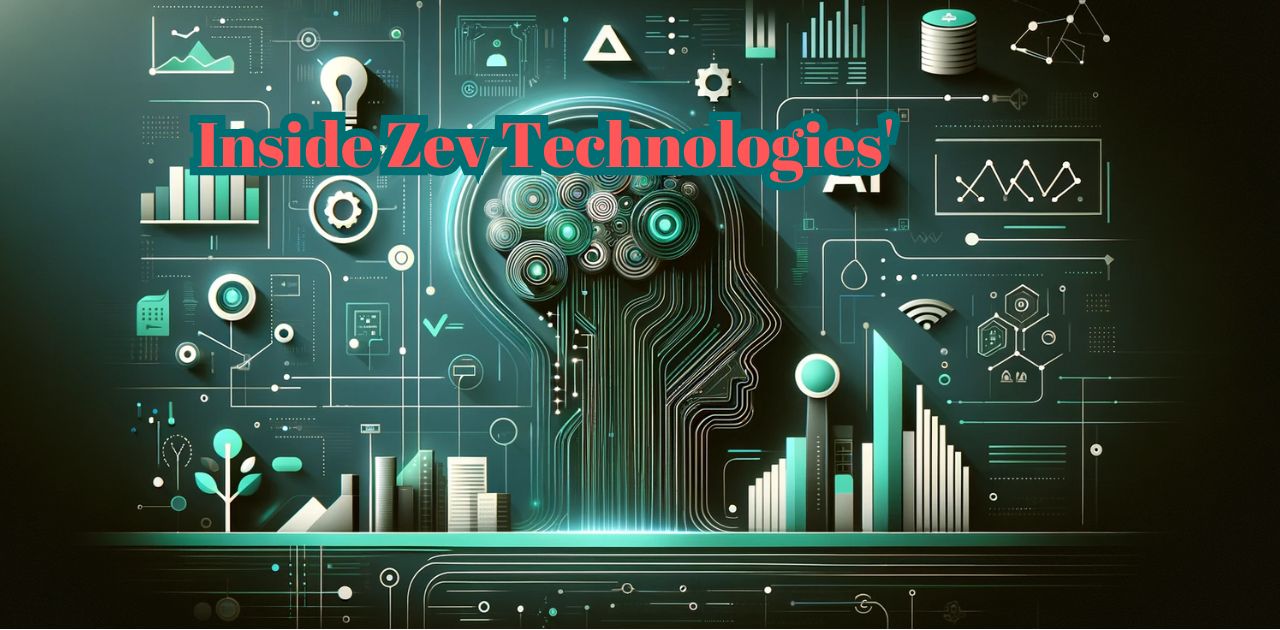
Introduction:
The imperative of innovation in the fast-evolving technological landscape:
Innovation is crucial in the rapidly changing technological world because it helps us through a dynamic period of unprecedented transformation. As new technologies show up, such as artificial intelligence and the soon-to-be 5G revolution, creativity becomes crucial for going ahead. This investigation examines the many facets of innovation, showing how it may improve experiences, boost productivity, and solve problems in society. Innovation goes beyond novelty to become the force pushing us toward a future where ethical considerations, sustainability, and relationships all come together. The need for innovation is highlighted by the way industries are shifting and adapting. We must never stop searching for novel methods to enhance our skills and resolve the moral quandaries that come with this rapidly evolving digital environment.
The consequences of stagnation in a dynamic digital era:
Stagnation has serious consequences in the rapid digital age as information is evolving at a rapid pace. In our ever-evolving world, failing to innovate and adapt puts individuals, businesses, and neighborhoods at risk of being outdated. The study explores the many consequences of inaction, ranging from lost chances for technical progress to inequities in economic activity and society. As industries experience revolutionary changes, embracing technology is crucial to preserving relevance and profitability. Stagnation presents a threat to progress and the development of remedies to urgent global issues. In a world where artificial intelligence, long-term viability, and connectivity are determining the future, a stalemate has negative effects on individuals as well as the larger fabric of our altering digital society. This highlights the importance of ongoing adaptation and innovative in this rapid time.
The Driving Forces: AI and Machine Learning
The pervasive influence of Artificial Intelligence (AI) in various industries:
The use of artificial intelligence (AI) has a profound effect on a wide range of industries, altering the face of economy and innovation. AI enhances diagnostics and tailors’ therapies in healthcare. In manufacturing, it streamlines procedures for increased accuracy. AI-driven data helps the banking industry, and the retail industry undergoes a change thanks to improved processes and tailored suggestions. Adaptive learning systems are being used in education, while autonomous cars are revolutionizing transportation in the automotive sector. This investigation highlights AI’s disruptive potential beyond simple automation by examining the many ways it pervades various sectors. Understanding AI’s ubiquitous effect is crucial as we navigate this AI-driven transformation and shape a future where AI’s cognitive skills not only redefine but also fundamentally improve sectors.
Machine Learning as a key enabler of innovation:
Machine learning is a key innovation facilitator that opens up previously unimaginable possibilities in a variety of fields. Machine learning, a branch of artificial intelligence, creates a mutually beneficial interaction between data and insights by enabling systems to learn and adapt without explicit programming. Its uses are numerous, ranging from tailored suggestions that improve user experiences to predictive analytics that optimizes company plans. This investigation explores the revolutionary potential of machine learning, emphasizing how it can automate decision-making, interpret intricate patterns, and completely change whole sectors. In a world dominated by data, machine learning’s natural flexibility becomes a source of innovation, leading us into a future where its dynamic capabilities drive ongoing breakthroughs and completely transform the way we approach challenges and realize their potential.
The Virtual Frontier: Augmented and Virtual Reality (AR/VR)
Applications of AR/VR beyond gaming and entertainment:
Virtual reality, VR, and augmented reality (AR) are emerging as game-changing technologies that go beyond the limits of entertainment and games to encompass an array of practical applications. While VR becomes a form of therapy for immersive experiences, AR helps in training for medicine and surgery simulations in the healthcare industry. By creating immersive and interactive learning environments, these technologies are changing education. AR enhances visualization in design and architecture, whereas VR allows virtual inspections. The study explores the many uses of AR and VR, highlighting how they may transform companies and improve user experiences. As we explore the endless possibilities of these technological innovations, their influence goes beyond pleasure; they are pioneers in numerous industries and portend an era when reality and virtuosity are becoming increasingly disconnected from each other.
Navigating the challenges and unlocking opportunities in AR/VR:
Going into the worlds of Augmented Reality (AR) & virtual reality (VR) involves confronting hurdles while also offering up an abundance of choices. Issues such as ensuring user safety, handling privacy issues, and improving seamless integration grow increasingly important as these technological advances change how we perceive and interact with the environment. But despite these challenges, there are few better chances. AR and VR enhance patient care and instruction in medicine. In terms of instruction, they offer creative learning opportunities. This study examines the complex world of AR and VR, showcasing the challenges that need to be resolved and highlighting the enormous potential for innovation, improving experiences, and changing markets. Achieving equilibrium between addressing obstacles and embracing multiple opportunities is crucial for navigating this constantly shifting environment.
Robotics and Automation: Enhancing Efficiency and Collaboration:
Collaborative robots in the workplace and their impact on productivity:
Cobots, also known as collaborative robots, symbolize an evolution in the workplace that will alter productivity and the concept of human-machine collaboration. These cobots easily cooperate with human coworkers to optimize efficiency and simplify procedures. Cobots, in contrast to their traditional counterparts, put security first, adapt to the movement of people, and foster an enjoyable work atmosphere. The study explores the groundbreaking implications of cobots, emphasizing their contribution to increased efficiency and challenging conventional assumptions about automation. Cobots have become essential in logistics as well as manufacturing floors, enhancing human skills rather than taking their place in the organization. A new era when human-machine collaboration is not only economical but also acts as a catalyst for invention and greater productivity has been heralded as industries embrace this cooperative revolution and realize its potential for improved efficiency.
Ethical considerations in the development and deployment of robotics:
The development of this revolutionary technology has been driven in a significant way by the moral quandaries surrounding its development and use. As machines develop, worries regarding accountability, transparency, and the influence on civilization rise to the surface. To ensure that robots conform to human values and make significant improvements to society, it becomes essential to strike a careful balance between development and ethical responsibility.
The present study examines the complex ethical terrain, recognizing that careful design of robotics must prioritize safety, justice, and respect for human freedom. Despite technological expertise, navigating this complicated landscape calls for a more general discussion on the ethical parameters that ought to guide the development and practical use of robotics. As we enter a new phase of automation, the moral issues related to robotics become paramount, shaping a future where technological progress harmonizes with human values and ethical standards.
The Role of Tech in Reshaping Industries:
Industry-specific technological advancements and their implications:
The implications of industry-specific technological advancements loom large as innovations reshape the landscape of various sectors. From the integration of Artificial Intelligence in healthcare for precise diagnostics to the automation of manufacturing processes through advanced robotics, each industry witnesses transformative shifts. These technological strides promise efficiency gains, enhanced productivity, and novel solutions to long-standing challenges. This exploration delves into the nuanced implications, acknowledging that the benefits come hand in hand with challenges. In healthcare, ethical concerns may arise alongside improved patient care. In manufacturing, job displacement may accompany increased automation. Navigating these industry-specific advancements requires a holistic understanding, ensuring that progress aligns with societal values, ethical considerations, and the overarching goal of fostering positive and sustainable impacts in each sector.
Case studies illustrating the transformative power of technology in diverse sectors:
Analyzing case studies demonstrates how innovations restructure industries and redefine possibilities, illuminating the transformational impact of technology across varied sectors. These examples highlight the dynamic effect of technology on a variety of industries, including healthcare (where telemedicine and precision medicine are revolutionizing patient care) and agriculture (where precision farming techniques maximize resource management). Blockchain technology is revolutionizing transactional transparency in banking, while adaptive learning systems are meeting the requirements of individual students in education. The study explores practical instances, demonstrating the concrete and various benefits that technology provides. Beyond the success narratives, problems also surface, requiring an advanced understanding of the ethical, moral, and economic implications. Upon analyzing these instances, an extensive viewpoint arises that highlights the revolutionary potential that technology has as a catalyst for growth as well as an engine of answers.
The role of innovation in maintaining competitiveness in today’s markets:
Maintaining competitiveness in the market of today requires a tactical application of innovation, resulting in a paradigm change in the way businesses navigate the constantly shifting industrial currents. The relentless speed at which innovations advance emphasizes how important it is for businesses to change constantly and value innovation as a key skill. The study examines the critical role that innovation plays for preserving productivity, emphasizing the need of companies to adopt agile methodologies, capitalize on emerging technologies, and cultivate a creative culture. Innovation is not limited to the creation of new goods; it also includes consumer experiences, company plans, and operational processes. Businesses that emphasize innovation not just stay relevant but also establish themselves as leaders, able to handle the constantly shifting conditions of today’s markets, as sectors evolve and customer expectations change.
The Ethical Landscape: Navigating Challenges in Tech Innovation:
Addressing ethical considerations in AI and data-driven technologies:
Since AI and technologies based on data are changing our constantly linked society, moral concerns must be tackled in these fields. Intelligent & data-driven technologies are developing at a rapid pace, posing an assortment of difficult ethical issues including privacy, prejudice, and social effects. A comprehensive strategy that harmonizes technical advancement with human principles and the welfare of society is needed to navigate this terrain. The study explores the complex ethical aspects, stressing the value of transparency, justice, and responsibility in the development and use of artificial intelligence and data-driven solutions. To ensure a harmonious relationship among innovation and the upholding of ethical standards in the digital age, it is crucial to consider the ethical implications of emerging technologies as they become more common.
Addressing ethical considerations in AI and data-driven technologies:
It is essential to address ethical issues with AI and technologies based on data as they are changing the way we live. The swift advancement of Artificial Intelligence and technology based on data presents intricate ethical dilemmas, involving worries regarding privacy, prejudice, and the influence on society. It takes an advanced approach to navigate this environment, combining technological advancement with human values and the welfare of civilization. This investigation dives into the complex ethical aspects, stressing the value of openness, justice, and accountability in the creation and use of AI and solutions based on data. To ensure that innovation and the preservation of moral values in the digital age coexist peacefully, these technologies’ ethical implications must be thoroughly investigated as they become more commonplace.
Final Words:
As we grow more cognizant of the importance that technology will be for shaping our future, it grows more and more essential to adopt tech trends to maintain innovation. The rapid development of technology requires joint mobilization from both businesses and people. In today’s dynamic markets, it is imperative to not only make a strategic choice but also to evolve and adapt in harmony with creating tech trends to stay relevant. The study highlights the revolutionary potential of technology, calling on businesses to instill innovation into their core principles and on individuals to adopt an ongoing education and adaption mentality.
This call to action encourages us to take an active role in the emerging technological future as we find ourselves at the crossroads of human creative thinking and advancement in technology. It’s the future where our collective endeavors and innovations not only drive economic growth but also enrich the human experience. In this symbiotic relationship between humanity and technology, the call to adapt, evolve, and contribute becomes a guiding principle, heralding a future where sustained innovation is not just a strategy but an intrinsic part of our journey towards a more advanced, connected, and impactful technological era.



















